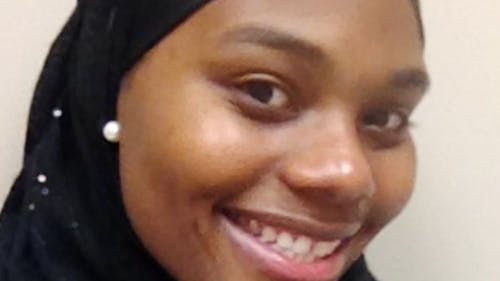Rutgers student launches abstinence sex education program for Muslim women

During her first year at the Rutgers School of Nursing, Shaakira Abdul Razzaq gave birth to her son and began to raise him as a single mother.
Now 26-years-old and scheduled to graduate from Rutgers in May 2017, Razzaq is using her personal experience to provide sex education for young Muslim women, she said in an email.
“Sex Education in the Mosque” is a research project created by the Rutgers Doctorate of Nursing Practice Team. The project was inspired by Razzaq's personal experiences of being a Muslim teenage mother.
The workshop uses an interactive curriculum combined with Islamic principles to promote abstinence and sex education, she said.
Razzaq's research is a starting point for other Muslim institutions. Her goal was to address premarital sex among Muslim youth while upholding Islamic religious values.
“My overall goal was to educate Muslim adolescent females on abstinence and its benefits, increase their knowledge about the prevention of HIV, STD’s and pregnancy while helping them to obtain positive attitudes and stronger intentions to abstain from sex until marriage," she said. "Most importantly, I recognized the high prevalence of premarital sex in the Muslim community and no one (is) really addressing it. I felt I had to initiate change for the health and spiritual well-being of other Muslim youth.”
Razzaq said that while premarital sex is strictly forbidden under Islam, a large number of Muslim youth engage in it.
“Limited or absent sexual education contributes to risky behaviors and uniquely places them at a higher risk compared to other populations,” she said.
Unplanned pregnancy and sexually transmitted diseases — including the HIV infection — contribute to the high rates of suicide among adolescents, according to the U.S. Center for Disease Control and Prevention.
“The best method of prevention for sexually transmitted diseases and unwanted pregnancy is abstinence,” Razzaq said. “Practicing safe sex by utilizing condoms, spermicides or birth control can help prevent the transmission of sexually transmitted diseases (and) pregnancy, but it does not help to build the adolescent’s self-esteem or self-confidence.”
Razzaq said she began her project by researching community-orientated sex education curricula that were proven to be effective.
At the Association of Nurses in AIDS Care Conference last year, she met the Dean of the College of Nursing and Health Professions at Drexel University, Loretta Jemmott, who is well-known for conducting similar community-orientated curricula.
“I informed her of my plan to adapt one of her already established curriculums, specifically for Muslim youth and we soon developed a professional relationship,” Razzaq said.
Razzaq then adapted her curriculum, which she called “Making a Difference by infusing the Quran and Sunnah." She said an Islamic scholar reviewed the curriculum to ensure its accordance with Islamic practices.
“The Making a Difference” curriculum uses social and behavioral theories to educate participants about sexuality and sexually transmitted diseases while instilling confidence to promote abstinence, she said.
Two other classmates worked on the project with Razzaq. The workshop consisted of eight interactive modules, which incorporated games, roleplaying and videos. It took place in a New Jersey mosque and lasted two consecutive days, she said.
Participants included single, never-married Muslim women between the ages of 13 and 19, from northern New Jersey.
Razzaq has received both positive and negative reactions to her project.
Some of Razzaq's academic colleagues felt her project was not productive because abstinence-based curricula are commonly viewed as “ineffective and impractical,” she said.
She said because sex is considered a taboo in the Muslim community, many felt Razzaq was out of line when she used the phrase “Sex Ed in the Mosque.”
“They felt (the phrase) was very inappropriate and another choice of words should have been used,” she said. “Such negative responses and misconceptions on what I would be teaching about sex affected the number of participants I was able to recruit (to the workshops).”
While her goal was to recruit at least 20 girls in each age group, only nine attended the session of younger girls.
Many also criticized the research for not including men, Razzaq said.
“We decided to start with females only as a basic starting point and (then) further adapt the curriculum in the future for males, as they learn slightly differently and may be more receptive to male facilitators,” she said.
Still, Razzaq said she received positive feedback.
Girls ages 16 to 19 were much more receptive to the program and enrolled themselves in sessions independently rather than relying on parents to do so, Razzaq said.
She said Muslim scholars and Imams showed approval for the project.
“They knew sex was rarely discussed in the masjid (another term for a mosque) and even in the homes with Muslim youth,” she said. “They felt I would be a great mentor to conduct the program as I was a young, Muslim female myself, highly qualified as a registered nurse and even experienced teenage pregnancy.”
Razzaq received help from the Muslim communities in northern New Jersey who promoted the project and helped gain participants for the study. The masjid, which hosted the project also donated food for participants during the duration of the project.
Razzaq said her family was also a motivating factor and acted as a support system throughout her years of school.
Over the past few weeks, she has received a response from individuals and Muslim organizations around the country and world, hoping to conduct similar seminars in their communities.
Razzaq plans to analyze the data from her research to confirm the curriculum's effectiveness and expand her research going forward.
In the future, she aims to replicate the study with a male focus, as well as copyright the curriculum with Jemmott so it is available to Muslim institutions and communities with large Muslim populations.
The School of Nursing did not respond to a request for comment.
Noa Halff is a School of Arts and Sciences junior majoring in journalism and media studies. She is an associate news editor for The Daily Targum.



